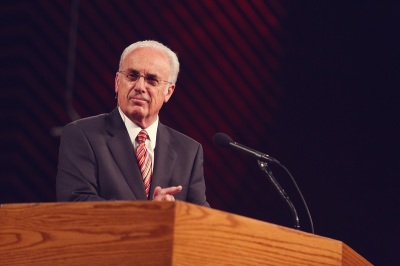
“Precious in the sight of the Lord is the death of his saints” (Psalms 116:15).
On July 14, California pastor John MacArthur entered into glory at the age of 86, closing a monumental chapter in Evangelical history. For over five decades, MacArthur was a pillar of biblical exposition, pastoral leadership, and theological conviction. His death marks the end of an era, yet his influence will continue to echo in pulpits, seminaries, and Christian homes for generations to come.
Born on June 19, 1939, in Los Angeles, California, John Fullerton MacArthur Jr. came from a line of ministers. His father, Jack MacArthur, was an evangelist and broadcaster, and his grandfather also served in ministry. It was clear from early on that John MacArthur was being shaped for a life of proclamation and pastoral care.
After earning his education at Bob Jones University, Los Angeles Pacific College (now Azusa Pacific University), and Talbot Theological Seminary, MacArthur was called to Grace Community Church in Sun Valley, California, in 1969. He remained there for 55 years, preaching verse-by-verse through the Bible with unwavering fidelity to Scripture. His expository preaching was not merely a method — it was a theological conviction rooted in his belief in the sufficiency, inerrancy, and authority of the Word of God.
MacArthur’s ministry was characterized by his deep commitment to biblical truth, even when it brought controversy. He famously preached through the entire New Testament — a feat that took over four decades — and published those sermons online for free through his media ministry, Grace to You. Millions around the globe have accessed his teachings, and his influence can be seen across denominations and continents.
But MacArthur was more than just a preacher. In 1986, he became president of The Master’s University (formerly Los Angeles Baptist College), and in 1986 he also founded The Master’s Seminary. These institutions became central to his vision for raising up the next generation of biblically grounded pastors. He believed deeply in the local church and sought to equip leaders who would not waver in the face of cultural pressure. His commitment to rigorous theological training was rooted in his belief that pastors are stewards of divine truth — and must be prepared as such.
MacArthur’s unwavering stance on doctrine often placed him at odds with broader evangelical trends. He opposed the seeker-sensitive movement, the prosperity gospel, and progressive theological trends that undermined biblical authority. In his 1993 book Charismatic Chaos, he offered a bold critique of the charismatic movement, insisting that biblical fidelity must never yield to experience-driven faith.
His 2018 Statement on Social Justice and the Gospel, co-authored with other conservative theologians, rejected the notion that social justice should be considered a part of the gospel message. For MacArthur, the Gospel was clear: Christ crucified, risen, and returning. To conflate it with political or cultural aims was, in his view, to dilute the saving message of Christ.
Perhaps no moment demonstrated his courage more than during the COVID-19 pandemic. When government mandates sought to restrict worship gatherings, MacArthur and Grace Community Church defied California regulations, reopening their doors and declaring, “Christ, not Caesar, is Head of the Church.” His stand drew national attention — and lawsuits — but MacArthur remained unflinching, citing Acts 5:29: “We must obey God rather than men.” Ultimately, the state of California was forced to settle, paying the church $800,000 in legal fees.
Despite his critics — and they were many — MacArthur never wavered. He once said, “If you faithfully preach the Bible, you’re going to have a battle on your hands.” He embraced that battle not for the sake of conflict, but for the sake of the truth.
His legacy is not just found in the thousands of sermons he preached or the dozens of books he authored — including The Gospel According to Jesus — but in the pastors he trained, the churches he influenced, and the laypeople he discipled from afar. He was a theologian of conviction, a shepherd of souls, and a servant of the Word.
His death leaves an irreplaceable void in evangelicalism.
John MacArthur’s passing is a loss to the church on earth — but a gain to Heaven. His last sermon was from Philippians 1:21: “For to me, to live is Christ and to die is gain.” That verse was not merely a text for him; it was a life philosophy. He lived for Christ — and now, he rests in Him.
In the years to come, it will become increasingly clear how much of an impact John MacArthur made on the shape of conservative evangelicalism in the late 20th and early 21st centuries. In a time when biblical truth is often diluted, his ministry served as a clarion call back to the authority of Scripture, the centrality of Christ, and the sufficiency of the Gospel.
Grace to You, the teaching ministry of John MacArthur, in a statement wrote, “our hearts are heavy, yet rejoicing, as we share the news that our beloved pastor and teacher John MacArthur has entered into the presence of the Savior. This evening, his faith became sight. He faithfully endured until his race was run” (2 Timothy 4:1-8).
And now, he hears the words we all long to hear: “Well done, good and faithful servant. Enter into the joy of your master” (Matthew 25:21).
Originally published at Juicy Ecumenism.
Bethany Moy serves as Research Associate with the Institute on Religion & Democracy. A graduate of Gordon College in Wenham, Massachusetts, Moy is pursuing a Master’s degree in U.S. Foreign Policy from the School of International Service at American University in Washington, DC.

















